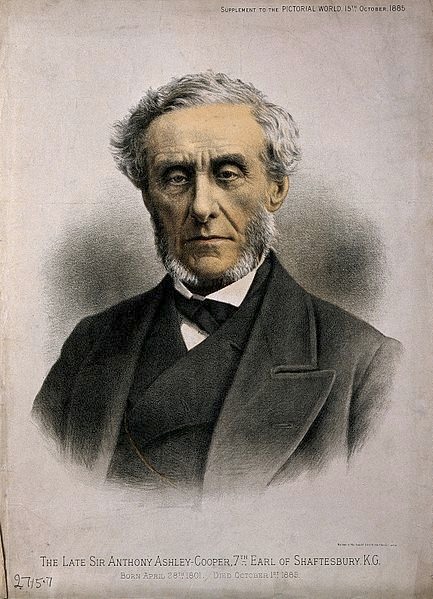BRITAIN AND THE RETURN OF THE JEWS TO PALESTINE

Anthony Ashley Cooper, 7th Earl of Shaftesbury.
Colour lithograph by Maclure & Macdonald, 1885
But that still wasn't the end of the story. In 1882, the initiative for Jewish emigration passed over to the Mansion House conference in London. This is where the remarkable figure of Laurence Oliphant (who, strangely, isn't mentioned by Solzhenitsyn) comes into the picture.
There was a lively tradition of 'restorationism', as Zionism was known in the nineteenth century, in Britain. Some time in the 1820s a woman called Mary Seddon was confined to a lunatic asylum after she had hired a donkey and set off with a group of Jews for Jerusalem to begin the return of the Jews to the Holy Land (the group of Jews abandoned her in France). That may be an eccentric example but it is worth mentioning because she happened to be the grandmother of Beatrice Webb. Eitan bar-Josef, in his essay on Christian Zionism and Victorian culture takes it as a paradigm for his argument that though restorationist views were widespread and held by often very influential and wealthy people they were still regarded as not quite respectable. He quotes a story told by the very keen restorationist Anthony Ashley Cooper, Seventh Earl of Shaftesbury, in 1862:
'Once when he was sitting on the [Lunacy] Commission as Chairman the alleged insanity of a lady was under discussion, he took a view of the case opposite to that of his colleagues. One of the medical men who was there to give evidence, crept up to his chair and, in a confidential tone, said, "Are you aware, my lord, that she subscribes to the Society for the Conversion of the Jews?" "Indeed!" replied Lord Shaftesbury; "and are you aware that I am President of that Society?"'(5)
(5) Eitan bar-Yosef: 'Christian Zionism and Victorian Culture', Israel Studies, Vol. 8, No. 2 (Summer, 2003), p.20. Bar-Yosef is a historian based in the Ben Gurion University in the Negev.
The reference is to the London Society for promoting Christianity among the Jews, established in 1809 with the restoration of the Jews to Palestine as one of its main aims. Bar-Josef's argument is that although the return of the Jews to the Holy Land in fulfilment of prophecy was a major and serious concern of many well known and powerful people, it had to be represented in terms of a practical Imperialist interest if it was to achieve respectability. Getting British control of Palestine as part of a process of facilitating access to India could be seen as a valid foreign policy objective but it was by no means obvious that peopling Palestine with Jews was the best way of achieving it. Thus Shaftesbury describes the means he had to employ to win Palmerston, his father-in-law, to the cause in 1840:
'August 1. Dined with Palmerston. After dinner left alone with him. Propounded my scheme, which seemed to strike his fancy; he asked some questions, and readily promised to consider it. How singular is the order of Providence! Singular, that is if estimated by man's ways! Palmerston has already been chosen by God to be an instrument of good to His ancient people; to do homage, as it were, to their inheritance, and to recognise their rights without believing their destiny. And it seems he will yet do more. But though the motive be kind, it is not sound. I am forced to argue politically, financially, commercially; these considerations strike him home; he weeps not like his Master over Jerusalem, nor prays that now, at last, she may put on her beautiful garments ...' (p.28) (6)
(6) The context here was an upsurge of interest in the possibility of Jewish emigration to Palestine prompted by 'the struggle between the Sultan and Mehmet Ali [of Egypt], in which the Powers intervened, for the lordship of Palestine, the appointment of a British Consul at Jerusalem, Britain being the first of the Powers to take that step, the Damascus outrage [a pogrom prompted by the charge that Jews had used Christian blood to bake unleavened bread] which shocked the British conscience and moved Parliament and the City of London to protest.' In 1845 Britain claimed a right of protection for the Jews living in Palestine. This comes from Albert M.Hyamson: 'British projects for the restoration of Jews to Palestine', Publications of the American Jewish Historical Society, No 26 (1918), pp.134-5.
Palmerston, for whom preservation of the Ottoman Empire as a bulwark against Russia was a major foreign policy objective, was well aware of the religious motive behind the restorationist cause:
'"Pray don't lose sight of my recommendation to the Porte, to invite the Jews to return to Palestine," he wrote to the British ambassador in Constantinople on 4 September: "You can have no idea how much such a measure would tend to interest in the Sultan's cause all the religious party in this country, and their influence is great and their connexion extensive." These issues "excite a very deep interest in the minds of a large number of persons in the United Kingdom and the Sultan would enlist in his favour the good opinion of numerous and powerful classes in this country ...' (Bar-Josef, p.29)